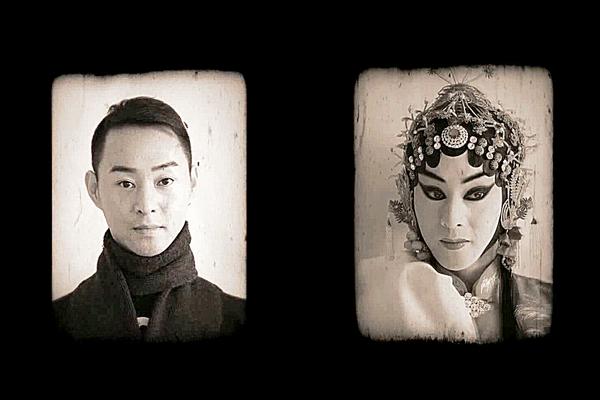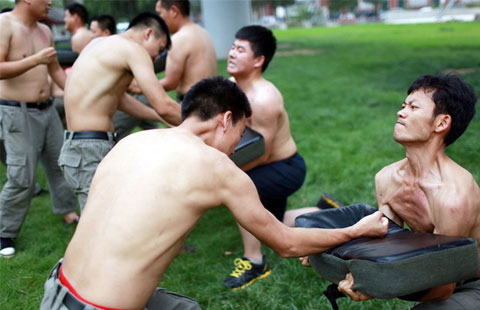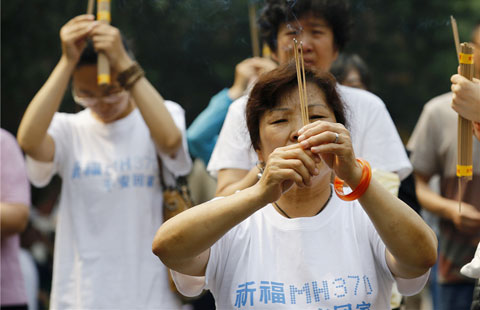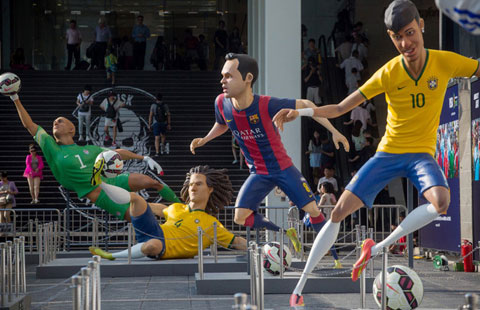


Varvara Shavrova believed she was looking at one of the most beautiful women she’d ever seen. But she was wrong.
Not about the beautiful part. About the woman part.
The Russian-Irish artist and curator was stunned when Chinese friends told her the female Peking Opera character onstage at the teahouse near the Forbidden City was actually a man.
“I said ‘No’. And they said ‘Yes’. And I said ‘No’ — and still couldn’t believe it,” she recalls.
But that wasn’t all that captivated her about the show.
“I loved the costumes, the makeup, the movements and how it can be formulaic in its own language,” Shavrova says.
“You can compare it to contemporary art.”
This initial fascination prompted the Russian-Irish artist and curator to research Peking Opera’s history, understand the actors’ lives and document their preparations and performances in her exhibition
Peking Opera was initially an exclusively male pursuit, with female characters played by male actors since Emperor Qianlong (1711-1799) had banned all female performers in 1772. Although the ban was lifted in 1912, the tradition of males playing female roles continues.
This requires actors to put on layers of makeup and costumes, and heavy headdresses, which Shavrova says are almost like “helmets”.
She photographed actors getting dressed, in sets of eight, to show the gradual transformation.
For example, the first picture of a series features a man without any makeup. The next few show the man applying layers of heavy makeup and putting on a head cloth to cover his hair, followed by an elaborate headdress with beautiful decorations. In the last few photographs, the character’s femininity emerges.
The final shot shows what appears to be a woman with long hair, delicate facial features and a soft gaze.
The exhibition also displays a large-scale projection of a 17-minute film demonstrating Chinese opera and two plasma screens showing five-minute time-lapse videos.
The exhibition was originally commissioned by and shown at the Espacio Cultural El Tanque in 2011— an old oil depot on the Spanish island Tenerife. It was shown in 2012 at the Ballina Arts Center in Ireland and this year at the Patrick Heide Contemporary Art gallery in London.
The first Peking Opera actor Shavrova met was Liu Zheng. He introduced Shavrova to others.
“I became friends with these people,” Shavrova says.
“We went out to dinner together and socialized.”
She came to realize the financial difficulties they face as the genre’s popularity declines.
“They’re doing lots of work for very little money,” she says.
“They have the fan groups and followers on blogs but a lot fewer compared to big pop stars. But they don’t do it for the money. They’re doing something entirely beautiful and they love what they do.”
She once asked Liu to dress her up as the female role in
When it was done, Shavrova stood up and felt dizzy.
“Literally, I couldn’t move. And these actors, on top of all this, they have to sing and dance, and they have to do a sword dance. It’s really tough,” she says.
But while contemporary performances have stolen the stage from Peking Opera, Shavrova believes the genre is modern, rather than archaic.
“I thought of it as being modern on an intuitive level,” she says.
“It is like contemporary art, which you wouldn’t understand unless you put time into understanding what the artist means. It was very charming and very beautiful.”
She also believes it operates according to its own rules.
“It has nothing to do with this life,” she says.
Shavrova worries this performance will die out if popularity further declines and if the Chinese government doesn’t sufficiently support it.
She points out a lot of the country’s architectural heritage, such as Beijing’s
Shavrova believes the solution may be the right promotion among youth, such as in schools.
“They have to understand that the actors are young and dynamic people, and not just some sort of old-fashioned boring people who have learned the lines by heart and are meaningless,” she says.
Shavrova was born and educated in Moscow. She moved to London in 1989 and shared her studio time between London and Ireland for the next 15 years, before moving to China in 2005.
At the time, Shavrova’s Irish engineer husband was working on a few architecture projects in China, so the couple relocated to China with their two children. Shavrova immersed herself in local life and the art community.
“I was really inspired by 798, the art district in Beijing. I was offered a studio, and I met some Chinese and international artists. And I felt it was a really dynamic place where I can make new projects,” she says.
One of her exhibitions in China is
Shavrova examines everyday Beijing life in
Her fascination with
London-based art dealer, curator and gallery owner James Birch says
“I like the idea of the before-and-after situation,” he says.
Birch has only seen Peking Opera images in books but never in an art exhibition.
Birch says the show will also generate more international awareness about Chinese culture.
“Many people don’t know about Peking Opera, so it’s good to make people aware,” he says.
Betty Yao, director of the London-based exhibition management firm Credential International Arts Management, also believes
“As overseas Chinese, we all feel proud of what Peking Opera represents,” she says.
“But we have little opportunity to know more about it. We always think this is an art form for old people. What is fascinating for me is to see an artist representing a very modern contemporary angle to look at something that is a loved art form — it’s her ability to create that bridge — bring in traditional art forms through creativity and reach the younger people of today.”







